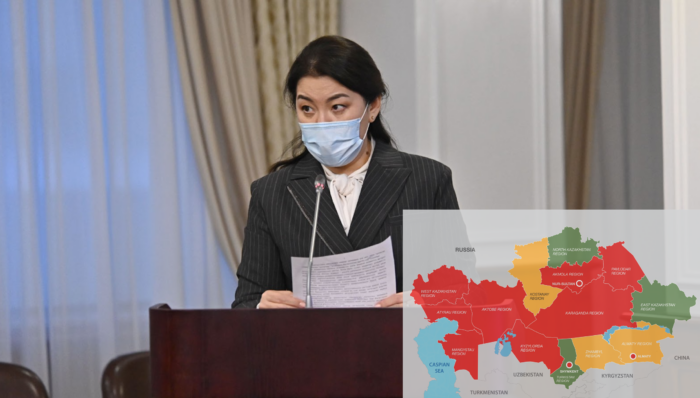NUR-SULTAN – COVID-19 cases have increased by 41 percent in two weeks due to the circulation of omicron, said newly appointed Kazakh Minister of Healthcare Azhar Giniyat at the Jan. 12 government meeting.
The reproductive number has increased by 2.4 times since Jan. 1 and totals 2.2 nationwide.
As of Jan. 14, Nur-Sultan, Almaty, and Shymkent cities, Atyrau, Akmola, Aktobe, West Kazakhstan, Mangistau, Karaganda, Kyzylorda, and Pavlodar regions are in the red zone, while Almaty, Zhambyl and Kostanai regions are in the yellow zone and other regions are in the green zone.
“At the beginning of January, the omicron variant was confirmed in Almaty and Nur-Sultan. This variant is highly transmissible with an increased risk of reinfection. Omicron multiplies 70 times faster than the Delta variant,” said Giniyat.
The interdepartmental commission released the new restrictions to fight the infection.
Now people who can prove recent recovery from COVID-19 or provide proof of a full vaccination course (green status in the Ashyq system) are able to access trade malls and karaoke bars.
SPA, sports and fitness centers are also open only for people with green status from Jan. 13.
People who arrive in Kazakhstan from other countries should provide a negative COVID-19 PCR test regardless of vaccination status from Jan. 15.
In the cities and regions in the red zone, schoolchildren will study online until Jan. 31 and students will study remotely until Feb. 6.
All mass events except for funerals with the participation of up to 30 people are banned. Entertainment, cultural and religious activities, conferences and seminars are banned.
At least 70 percent of employees of state bodies, national companies and other companies should switch to remote work.
The Ministry of Healthcare recommends people to avoid visiting crowded places and not to hold or attend mass events. It is recommended to use masks not only in public places, but also on the street.
The interim preliminary studies show that revaccination protects against severe forms, hospitalizations and deaths up to 70 percent.
More than 9.4 million people (49.3 percent) have been vaccinated with the first dose and more than 8.7 million people (45.8 percent) have been vaccinated with the second dose in the country.
People over 60 are now able to get revaccinated with the Comirnaty (Pfizer) vaccine along with other vaccines.

